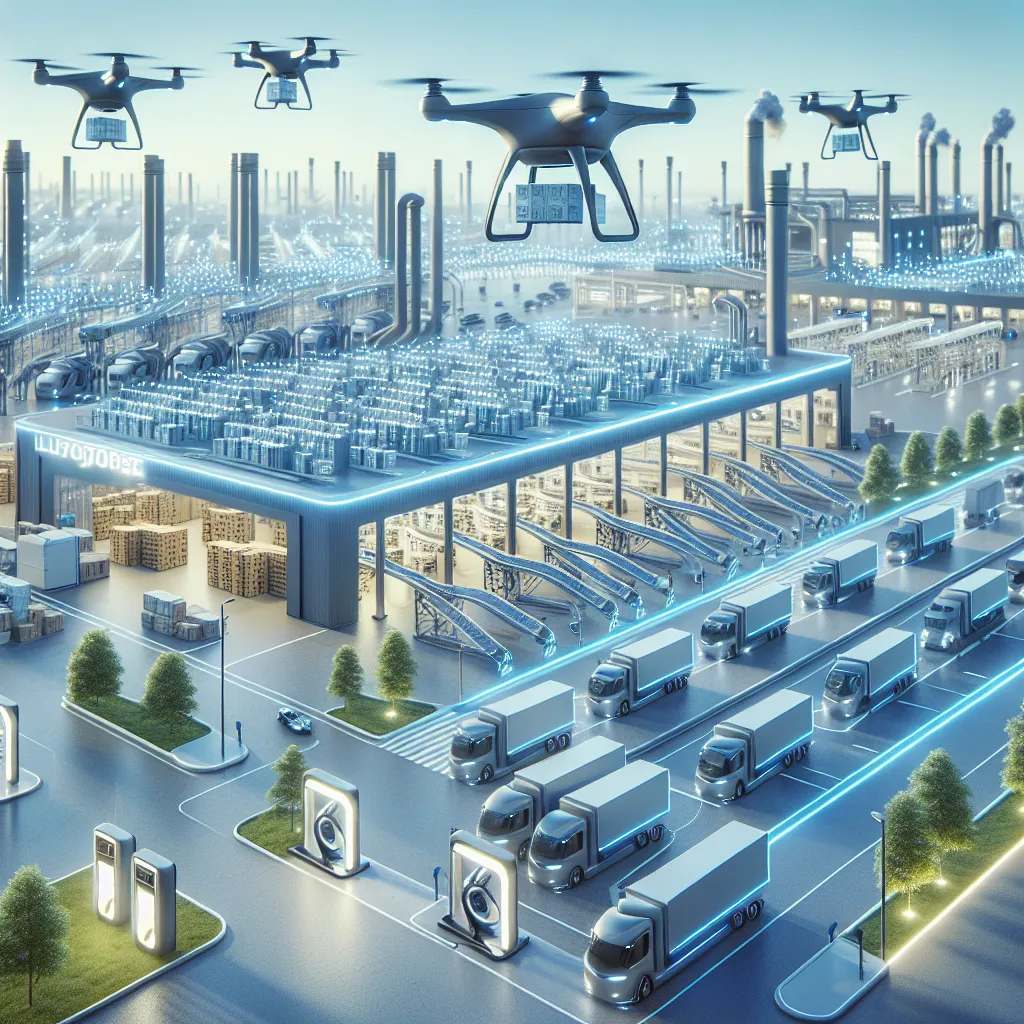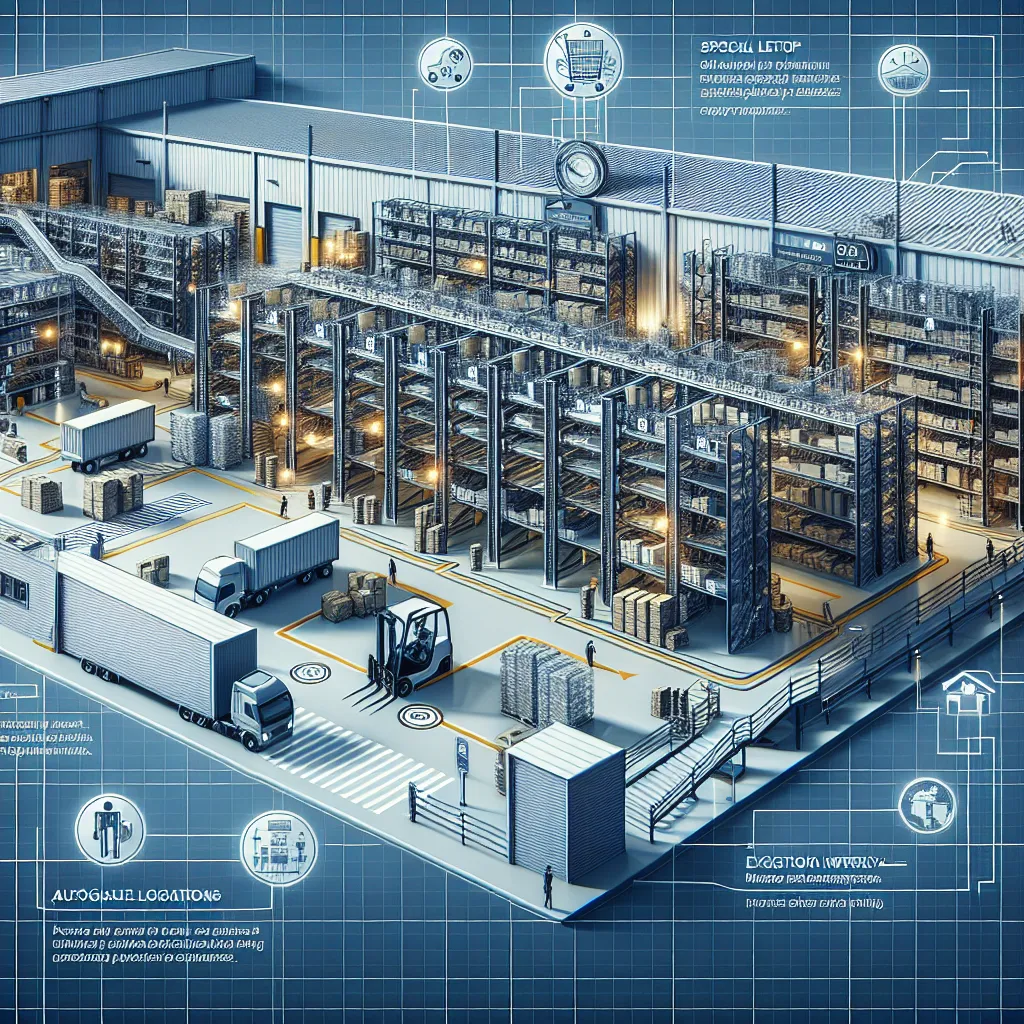The article “Implementing Automation in Warehouse Management” emphasizes the significance of incorporating automation technologies such as barcode scanning, RFID systems, and AS/RS to optimize warehouse operations. It highlights how these technologies enhance inventory accuracy, order fulfillment speed, and overall efficiency, leading to substantial cost savings in labor and operational expenses. Additionally, the implementation of automation enables companies to reallocate human resources to more value-added activities, ultimately gaining a competitive edge in the market. Furthermore, the article “Streamlining Inventory Tracking Systems for Improved Logistics” stresses the importance of advanced technologies like RFID, barcode scanning, and inventory management software in streamlining the tracking and managing of inventory for efficient logistics operations within a warehouse. These technologies provide real-time visibility and accuracy of inventory levels, reducing manual labor, minimizing errors, and offering insights to optimize overall efficiency and reduce carrying costs. The articles collectively present a compelling case for businesses to embrace automation and advanced technologies to elevate their warehouse management practices and achieve operational excellence.
Category: Logistics Services
Logistics services encompass a wide range of activities aimed at the effective management and movement of goods and resources. These services are integral to the supply chain process and include transportation, warehousing, inventory management, and distribution. Logistics services play a crucial role in ensuring the smooth flow of products from suppliers to customers, optimizing efficiency, and minimizing costs. From freight forwarding to order fulfillment, companies offering logistics services help businesses streamline their operations and meet the demands of a global market, ultimately contributing to improved customer satisfaction and competitive advantage.
In addition to the physical aspects of transportation and storage, logistics services also encompass important administrative functions such as documentation, customs clearance, and regulatory compliance. These services are essential for coordinating the complex network of international trade and ensuring that goods are delivered safely and in accordance with legal requirements. Good logistics services providers excel at leveraging technology and data analytics to track and monitor shipments, optimize routes, and provide real-time visibility into the supply chain. By offering comprehensive logistics solutions, these providers enable businesses to focus on their core competencies while meeting the evolving challenges of today’s dynamic marketplace.

The Future of Last-Mile Delivery Services
The article “Emerging Technologies Revolutionizing Last-Mile Delivery” highlights the transformative impact of innovations in last-mile delivery services, such as drone delivery, autonomous vehicles, and IoT-connected devices. The use of drones and autonomous vehicles promises unprecedented efficiency, speed, and cost-effectiveness in delivering packages, while reducing the environmental impact of traditional delivery methods. The integration of IoT technology enhances the transparency and efficiency of last-mile delivery, offering real-time package tracking and route optimization. The article underscores that these emerging technologies are revolutionizing the last leg of the supply chain, delivering unprecedented speed, efficiency, and reliability to the delivery process. Moreover, the article “Sustainability in Last-Mile Logistics: Challenges and Solutions” addresses the significant challenges faced by last-mile delivery services in achieving sustainability, emphasizing the environmental impact of traditional delivery vehicles and the need for efficient route utilization. It also presents promising solutions, such as alternative eco-friendly vehicles and advanced technologies for route optimization and delivery scheduling to mitigate the environmental impact and improve the long-term viability of last-mile delivery services.

Strategic Partnerships: Collaborative Approaches in Logistics Services
The article emphasizes the increasing significance of strategic partnerships in driving business growth and enhancing logistics services. It highlights how companies in the logistics industry can benefit from collaborations with other entities to access new markets, expand service offerings, and improve competitiveness. Furthermore, it discusses the advantages of leveraging resources through partnerships, adapting to market demands and technological advancements, and mitigating risks. The power of collaboration is underscored as a key factor in achieving mutual benefits and sustained success within the competitive logistics landscape. The article provides a compelling insight into the potential of strategic partnerships to transform and strengthen logistics companies, making it a valuable read for industry professionals seeking strategic growth opportunities.

Enhancing Efficiency: Innovations in Logistics Services
In today’s dynamic business landscape, the article “Revolutionizing Supply Chain Management: The Impact of AI and Automation” presents a compelling case for the transformative power of advanced technologies such as artificial intelligence (AI) and automation in logistics services. The integration of AI algorithms and automation technologies is revolutionizing route planning, warehouse operations, and demand forecasting, leading to enhanced operational efficiency, cost savings, and improved customer satisfaction. The incorporation of AI and automation in logistics is poised to revolutionize supply chain management, ushering in a new era of optimization and transformation. Similarly, the article “Streamlining Transportation: The Role of Digital Platforms in Logistics” emphasizes the critical role of digital platforms in enhancing transportation efficiency within the logistics industry. Digital platforms offer real-time visibility, facilitate collaboration, and harness big data and analytics to drive improvements in efficiency, cost-effectiveness, and sustainability. Lastly, “Maximizing Warehouse Operations: The Potential of Robotics and IoT” underscores the significant potential of robotics and IoT in optimizing warehouse operations, leading to increased throughput, accuracy, and cost savings. The combined insights from these articles provide a comprehensive overview of the profound impact of advanced technologies on various facets of logistics and supply chain management, making the full reading essential for those seeking to navigate the evolving landscape of the industry.

The Future of Digitalization in Freight Forwarding
The articles explore the transformative impact of blockchain technology, automation, and artificial intelligence, as well as sustainability efforts in the freight forwarding industry. Blockchain has revolutionized supply chain operations by enhancing security, transparency, and efficiency, while automation and artificial intelligence are poised to bring unprecedented productivity and proactive problem-solving. The industry’s increasing digitalization underscores the importance of sustainability and eco-friendly solutions, as companies strive to incorporate these principles in their operational processes. The articles paint a compelling picture of how these technological advancements are reshaping the future of freight forwarding, making it a must-read for anyone interested in the industry’s evolution.

The Impact of Delivery Apps on Local Businesses
The article highlights the challenges faced by local businesses due to the rise of delivery apps, including increased competition, high commission fees, and operational strains. It emphasizes the need for strategic adaptation for local businesses to thrive in the digital age. The subsequent section provides strategies for local businesses to adapt to changing consumer behavior, such as embracing technology, enhancing the customer experience, and leveraging social media and digital marketing. The article effectively communicates the profound impact of delivery apps on local businesses and emphasizes the potential for thriving in the evolving landscape through strategic adaptation and embracing technology.

Key Challenges in Freight Forwarding Operations
The article provides a comprehensive overview of the impact of increasing global trade and complex supply chains on freight forwarding operations. It highlights the challenges faced by freight forwarders, such as managing diverse routes, navigating through variations in customs regulations, and dealing with the dynamic nature of global trade agreements and geopolitical factors. The need for technological innovation, strategic partnerships, and a deep understanding of the intricate global trade landscape is emphasized as essential for addressing these challenges. Furthermore, the role of technology integration and automation in addressing operational challenges in freight forwarding is explored, focusing on the improved efficiency, accuracy, real-time tracking, and compliance standards. The article concludes by emphasizing the necessity of adapting to these challenges through a combination of technology, strategic partnerships, and understanding the modern supply chain landscape. Readers are encouraged to dive into the full article to gain a deeper understanding of the strategies and solutions available for navigating the complexities of global trade and supply chains in the freight forwarding industry.

The Impact of Technology on Courier Services
In recent years, technology has profoundly revolutionized the courier industry, introducing innovations such as advanced tracking systems, route optimization algorithms, and automated sorting processes. These advancements have led to improved customer experiences, streamlined operations, and increased efficiency within the industry. The integration of GPS tracking, barcoding, and sophisticated software systems has provided customers with real-time updates on their packages, enhancing transparency and supply chain management. Furthermore, the implementation of automation and robotics has accelerated package processing, reduced human error, and contributed to faster turnaround times. Additionally, data analytics and predictive algorithms have optimized delivery routes, resulting in significant cost savings and reduced fuel consumption. Overall, technology has ushered in a new era of efficiency, reliability, and environmental sustainability in courier services, and its continuous advancement promises further innovations for the industry.

The Role of Technology in Streamlining Logistics Processes
The article “Implementing Automation in Warehouse Management Systems” emphasizes the crucial role of automation in streamlining logistics processes and enhancing overall performance. It highlights the use of automated storage and retrieval systems (AS/RS) as a key aspect, enabling businesses to reduce manual labor, minimize errors, and optimize warehouse space. Furthermore, the article discusses how automation allows real-time tracking of inventory, shipments, and order fulfillment, facilitating proactive decision-making and improving efficiency. Additionally, it emphasizes the significant cost savings and increased productivity that can be achieved through the integration of automation. Overall, the article provides valuable insights into the benefits of automation in warehouse management, making it a compelling read for businesses seeking to improve their logistics operations.

Challenges and Opportunities in the Courier Industry
The rise of e-commerce has greatly impacted the courier industry, presenting both challenges and opportunities. As online shopping continues to soar, there is an increasing demand for efficient courier services to handle the higher volume of parcels and meet evolving customer expectations for faster delivery. This surge in e-commerce activities has spurred a significant transformation in the industry, necessitating companies to adapt to the changing landscape. However, amidst these challenges, the e-commerce boom has also created new opportunities for courier companies to capitalize on specialized services and technological advancements. The adoption of innovative solutions, such as same-day delivery and automated sorting systems, has the potential to revolutionize the logistics landscape, ultimately enhancing efficiency, reducing costs, and minimizing environmental impact. The future of the courier industry depends on its ability to embrace sustainability, with the integration of electric vehicles, renewable energy sources, and paperless technologies among the key solutions to minimize the industry’s environmental footprint. Readers are encouraged to delve into the full article to explore the comprehensive impact of e-commerce on the courier industry and the growing necessity for sustainable solutions to drive its future growth.

